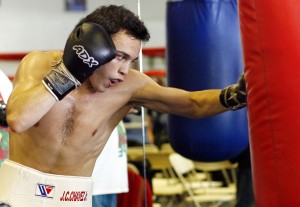Writing about Chavez Jr. while thinking about Donaire

SAN ANTONIO – Another deadline comes and goes in the silly saga of whether the two best fighters in our sport in 2009 will fight one another in 2012. It’s all bad faith now. A promoter goes to the Philippines to present his fighter four options no fan asked for. A fighter gets on Twitter to make a faux demand he didn’t make years ago, when it might have mattered.
If there is solace to be found in the tired spectacle this time round, it’s how comparatively little folks care. The truth of the Great Recession now touches every American. Quibbles between millionaires about purse splits don’t have the traction they did years ago. The parties are no closer to making this fight than last time, but at least there was no midnight conference call.
Casual fans have given up on the Fight That Would Have Saved Boxing. When they ask about it these days, it’s to change the subject rather than make an honest inquiry. They hear you talking about Andre Ward or Sergio Martinez, men they wouldn’t recognize if watching a Ward-Martinez fight, and interrupt you to say: “What I want to know is when are Mayweather and Pacquiao gonna fight!” You start to explain the latest cramp in negotiations. Then you find no one listens; hey, what do you think of Tebow Mania?
Promoter Bob Arum appears, now, to be the party who does not want the fight to happen while he wrestles with lesser evils: Do I dislike Golden Boy Promotions enough to guarantee Mayweather a gargantuan purse and make the fight without them, or do I dislike Mayweather enough to deny him the fight his resume needs? The likely answer is: Arum dislikes more whomever he just spoke to.
People round boxing no longer believe Floyd Mayweather is afraid to lose to the guy they saw fight Juan Manuel Marquez in November. In a better world for Mayweather, that would be enough; he won the fight without having to make it. One senses, though, Mayweather’s financial situation is precarious enough he’ll soon need the Pacquiao purse.
Boycott both of them, then, and to hell with it!
No, not so fast. There is an interesting balance that must be struck, especially as it pertains to Arum. His company, Top Rank, is the country’s preeminent promoter. It is an excellent outfit that makes its fighters and employees available. Top Rank does the best kick-off press conference in the business.
That’s what went through my head a couple Tuesdays ago at Alamodome. We were gathered before a very large stage and sound system for an otherwise intimate affair. The field behind us was being transformed from Alamo Bowl host to All-American Bowl host. If you looked far enough northwards and used your imagination, you could see where the black curtain would hang for February’s HBO “World Championship Boxing” fight card.
Arum was there. Hall of fame matchmaker Bruce Trampler was there. Trainer Freddie Roach was there. HBO’s Peter Nelson was there. Puerto Rican great Wilfredo Vazquez Sr. was there. Future great Nonito Donaire was there. And yet, we all waited for Julio Cesar Chavez Jr. – still known as “Son of the Legend.”
Chavez was the reason for our gathering, whatever we might opine of him. In three Saturdays, Chavez will headline 2012’s first big fight card, in this city. Unbeknownst to him, probably, he’ll begin quite a stretch for Texas boxing, one that will see a Showtime card 150 miles southeast of here, in Corpus Christi, a couple weeks later, and then an even bigger HBO card 200 miles east of here, in Houston, a few weeks after that. But it all starts with Chavez.
That is a sentence difficult to write as it is to read.
Chavez’s fanbase is gaining some authenticity, though. Chavez is fighting bigger, better, darker men, little by little, while projecting more of the spoiled-rich-kid resentment ridiculed by those who do not understand it despite its historical ferocity and effectiveness.
It’s a funny thing, ticket sales. Nobody I’ve ever spoken to – in what is becoming a tradition of covering Chavez Jr. fights – ever names him as a favorite fighter. Most Mexicans pay homage to the patronym while humoring the epigone. And yet.
Sitting on the same side of the podium as Chavez was Nonito Donaire, who appears to have every tool. Donaire will make an exciting fight with Wilfredo Vazquez Jr. on the same night Chavez fights fellow Mexican Marco Antonio Rubio. Donaire is enormous even for his new weight class. He is well-spoken. He gives every appearance of sincerity. He’s not classically handsome, but he has a great sense of style. He’s an incredibly talented prizefighter. And yet.
Chavez is the main event here on Feb. 4, not Donaire. They will fight in Lone Star State because Chavez sells more tickets here than Donaire would in the Bay Area (and because Texas is a right-to-work state, with all that implies).
Which brings us to the mystery of ticket selling. It’s easier, at times, to celebrate those who sell tickets than to explain those who do not. Donaire is an offensive force of the first rate who’s made a habit of winning his biggest fights by knockout. He also has the best promoter in the United States. And yet.
If it were tenable, one might suggest, the premium networks, HBO and Showtime, ought to offer licensing fees that are a percentage – whatever percentage – of a fight’s paid gate. This wouldn’t change the networks’ rosters of fighters, necessarily; it would change the compensation systems they use.
Where would that leave Nonito Donaire? Hard to say. But it’s also a good yellow light for aficionados looking to cure boxing. Ridding ourselves of corrupt sanctioning bodies, alone, won’t do it. But it may also not be simple as rewarding ticket sellers.
Bart Barry can be reached at bart.barrys.email (at) gmail.com